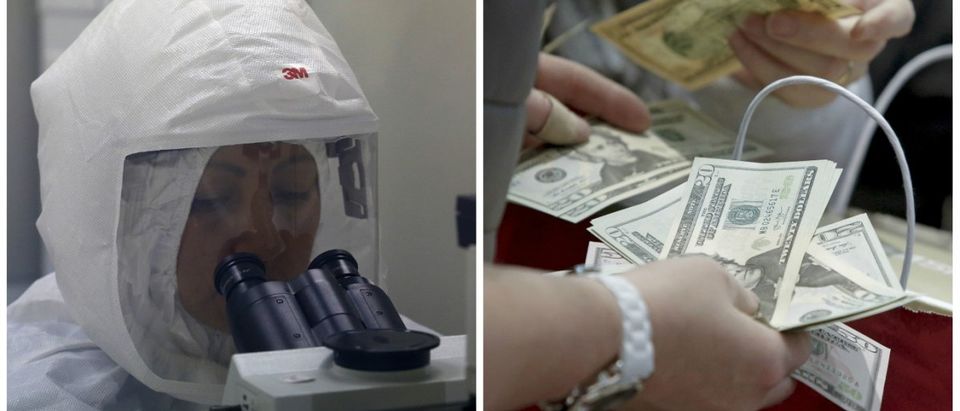Scientists faking their government-funded research and defrauding taxpayers are drastically increasing in number, and a major federal agency has no idea how much of its $7 billion investment is lost to such misconduct, waste or theft, The Daily Caller News Foundation Investigative Group has learned.
The National Science Foundation (NSF) funds research projects to the tune of $7 billion in taxpayer funds every year, but officials there don’t estimate how much goes to cheaters who manipulate data, plagiarize and steal public money.
“We don’t generally speculate about how much misconduct is undetected,” NSF spokesman Bobbie Mixon told TheDCNF. (RELATED: Feds Cover Up Numbers On Fake Science)
Even so, NSF’s Inspector General (IG) — the agency’s internal watchdog — closed 74 investigations over the last two years that caught researchers plagiarizing, manipulating data, stealing, wasting government money, or committing other fraud, TheDCNF found.
The cases include researchers who falsified data, plagiarized other work, spent NSF money on personal expenses, invented fictitious employees, used taxpayer dollars for online gambling, and much, much more. Some researchers saw jail time for their misdeeds, while others made genuine mistakes – which still threatened or wasted taxpayer dollars.
And, like NSF, the IG also doesn’t actually know how much waste there may be in any given year, though investigators believe there is a lot of it. (RELATED: Feds Give Billions To Research Based On ‘Falsified Or Fabricated Data’)
The IG generally doesn’t “speculate about how much misconduct is undetected,” IG spokeswoman Susan Carnohan told TheDCNF. Consequently, there’s no estimate detailing how much of the NSF’s $7 billion goes into researchers’ pockets or funds plagiarism and data manipulation. The problem is growing drastically and is harming the scientific community and the public’s trust.
The IG has seen “a substantial increase” in misconduct and fraud cases, the watchdog reported in September, 2016. Investigators caught twice as many students falsifying their results during the 2011 to 2016 period as compared to the six years prior.
“The significant number of substantiated allegations of research misconduct investigated by [the IG] continues unabated,” the watchdog wrote. The IG report cited a survey that found 30 percent of researchers admitted “to engaging in questionable research practices or knowing someone” who does.
“Encouraging the ethical conduct of research” is one of NSF’s top challenges, the report said.
“As more stories about research misconduct circulate in the media, the public’s confidence in the research community as a whole is weakened and taxpayer support of science is undermined.”
Carnohan added: “Research misconduct damages the scientific enterprise, is a potential misuse of public funds and undermines the trust of citizens in government-funded research.”
Despite acts of misconduct, researchers can typically start collecting NSF checks just a few years after getting caught defrauding taxpayers. Each scientist in the cases TheDCNF reviewed were allowed to continue receiving NSF funds after getting caught and after a suspension.
“NSF officials disregarded recommended sanctions against some of the scientists and academics implicated in those findings,” The Washington Free Beacon reported. “Though many were temporarily barred from receiving additional federal funding, nearly all will be eligible for taxpayer support and official roles in NSF-funded research in the future.”
It’s also difficult to put a price on the known misconduct, since the IG frequently doesn’t list how much money was wasted or saved after it caught cheaters and fraudsters. The watchdog only reports such losses and recoveries in 35 of the 74 cases TheDCNF reviewed.
Government Attic – a private website that publishes government documents released under public records laws – published the IG reports.
Investigations saved or recovered nearly $8.7 million and identified another $9.3 million lost to waste and fraud, according to the reports published by Government Attic, though the IG did not note how much of the amounts identified were returned to the government.
One case alone accounted for $9.1 million of the waste. A university – whose name was redacted – “misused” funds related to 11 NSF awards. The matter was settled out of court, but the amount paid back to the government was redacted.
In fact, most of the cases were redacted and contained varying levels of information. The scientists and the names of institutions – which were frequently universities – were always redacted, even when individuals received convictions.
One researcher was caught trying to use NSF funds to pay for personal charges, such as “patio furniture, cell phones and a rental apartment,” a report said.
Another scientist “falsified data in three publications, each since retracted,” a second report said. The researcher was banned from receiving NSF funds for three years.
The IG referred one investigation to the university that employed a researcher who committed plagiarism in two requests for NSF funds. But the watchdog found the university’s subsequent report was either inaccurate or incomplete and had to prove the willful plagiarism.
“The subject knowingly committed plagiarism, which we deemed a significant departure from accepted practice ofthe Subject’s research community,” the report said.
Intern Kevin Klenkel contributed to this report.
Follow Ethan on Twitter. Send tips to ethan@dailycallernewsfoundation.org.
All content created by the Daily Caller News Foundation, an independent and nonpartisan newswire service, is available without charge to any legitimate news publisher that can provide a large audience. All republished articles must include our logo, our reporter’s byline and their DCNF affiliation. For any questions about our guidelines or partnering with us, please contact licensing@dailycallernewsfoundation.org.












